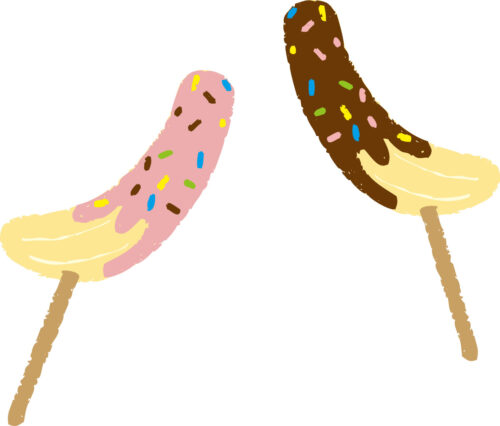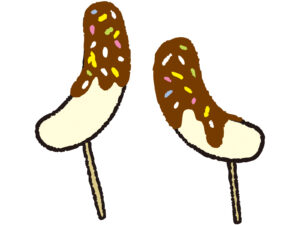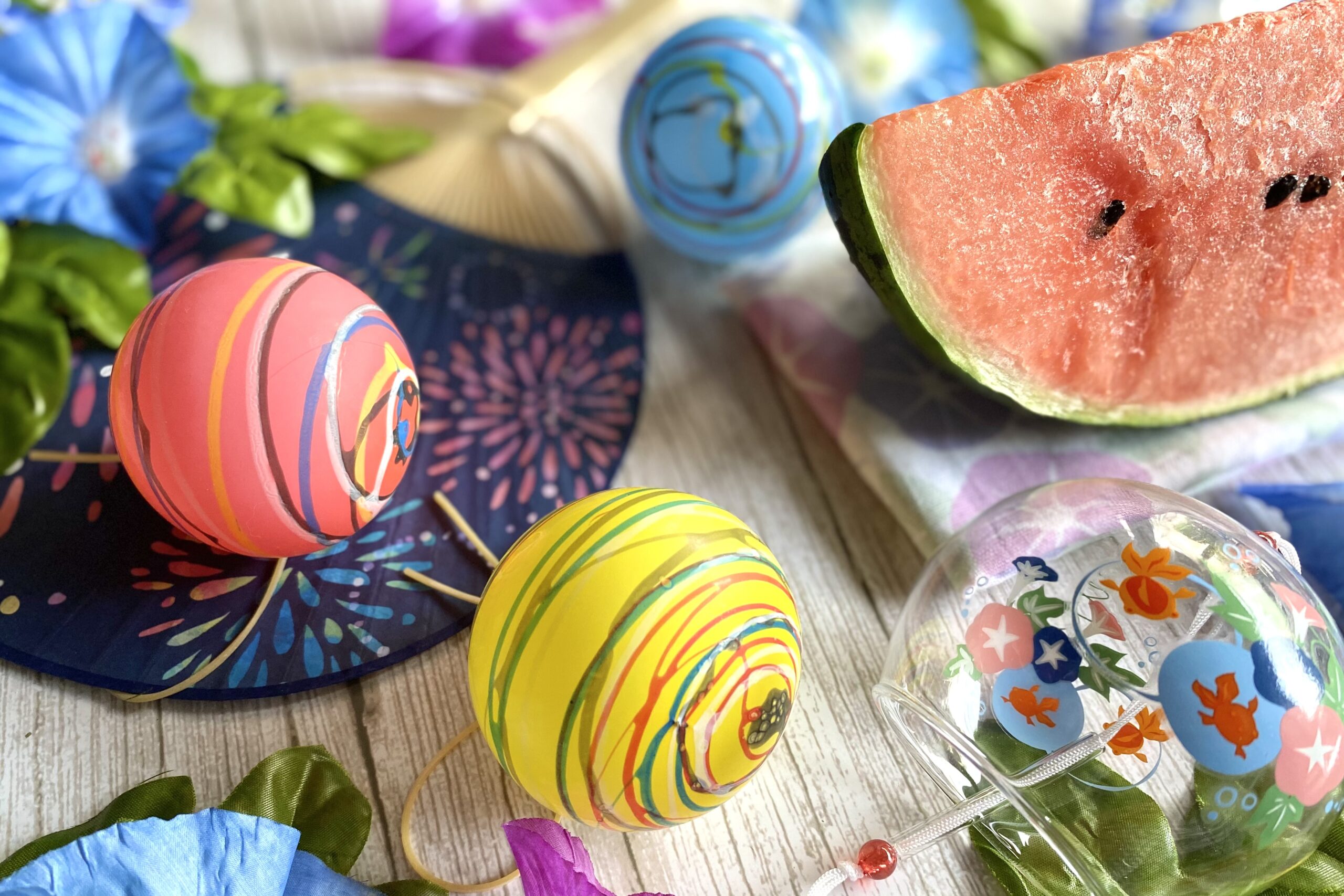随筆春秋「会員の部屋」
佐 藤 ゆ き
チョコバナナ
「ただいま」
高校二年になった息子が、氏神様の例大祭から帰ってきた。
「何か食べた?」
「鮎あゆとチョコバナナ」
「なんだか変な食べ合わせねぇ。おいしかった?」
「うん」
そんなたわいない会話もあと何回できるのだろう。

息子が中学三年の春のことだった。コロナ禍を機に、私と息子はそれまでの生活拠点だったニューヨークに夫だけを残し、日本に帰国した。
私の実家には高齢の両親がいたし、ニューヨークの学校はオンライン授業で、学習に支障が出始めていたからだ。そして、夏休みの間に家族で話し合い、息子は日本の高校を受験することになった。
志望校は帰国子女に有利な三つの高校に絞った。しかし、日本の高校受験のシステムは、三十年前に出国した私とアメリカで育った息子には難解で苦労した。
調べ始めると、国際生入試と呼ばれるテストは、二月の一般入試と比べ、かなり早い時期に行われることが多いとわかった。志望校の中で、最も早い入試は十一月初旬だった。
一校目の筆記試験を終え、保護者控室に戻ってきた息子は顔面蒼白そうはくだった。そして、
「失敗した」
とひと言……。
得意なはずの数学の解答は、その三分の一を空欄で提出し、国語の作文に至っては何を書いたかも覚えていない、と肩を落とした。模試など一度も受けたことがなかった彼は、極度の緊張で、他の受験生の鉛筆の走る音だけが耳に響き、頭も指も動かなくなってしまったらしい。
入試第一弾は惨敗に終わった。
それからまもなく、私の携帯アプリに、
「ゆき、元気? どうしてる? 今どこにいるの?」
と、ニューヨークのママ友から連絡が入った。近況と、息子の不合格エピソードを伝えると、彼女からすぐに返信が来た。
「それなら、バナナがおすすめよ」
彼女は、オーケストラ奏者一家に生まれ、自身も英才教育を受けたバイオリニストである。聞けば、プロの音楽家でもコンサート直前に緊張する人は多く、彼女の仲間たちはそんなとき、バナナをほおばるのだと言う。
「試験が始まる二十分前に食べてね」
私は、なんといい話を聞いてしまったのだろうと大喜びし、息子の緊張を和らげるために他にも何か有効なものはないかと、すぐに調べ始めた。そして、チョコレートの原料であるカカオに含まれるテオブロミンという成分に、神経鎮静作用があることを読み知った。そして気付いたのだった。
「チョコバナナだ」
作り方は簡単である。まずは、カカオ含有量の多いダークチョコレートを砕き、それを湯せんにかけて溶かす。お祭りのチョコバナナのように一本丸ごと外出先で食べるのは難しいので、バナナをスライスしてつまようじを刺し、溶かしたチョコレートにくぐらせる。あとは冷凍庫に入れてチョコレートがパリパリになるのを待つだけだ。
「おいしい。もっとないの?」
試作品は大好評だった。
不合格だった学校には、二回目の試験の申し込みができた。もう一校は十二月初旬、第一志望校は十二月半ばに試験を控えていた。
私は食べ頃のバナナがどこで買えるかリサーチし、念のため、試験の前々日に購入しておいた。そして試験前夜、チョコバナナを冷凍庫に入れると、私たちは早めに就寝した。翌朝、それを小さな容器に移し替え、保冷バッグに入れ、試験会場へと向かった。
息子はその後、志望校すべてに合格した。試験前にチョコバナナを食べたか食べなかったか、実は忘れてしまった。しかし、入試当日の私たちの安心感は、氏神様の合格祈願のお守りのご利益もさることながら、チョコバナナ様の偉大な効果であったことに間違いなかった。

Choco-Banana
“I’m home.”
My son, who has become a junior in high school, came home from the annual festival at the local Shinto shrine.
“Did you eat anything?”
“Yeah, I ate ayu and choco-banana.”
“That sounds like a weird combination. Were they good?”
“Yeah.”
I wonder how many more times I will get to have these mundane conversations with him.

It was my son’s last year of middle school when, due to the Covid-19 pandemic, he and I decided to leave my husband behind in New York City where we had been living and returned to Japan.
My elderly parents were still living in their house in Tokyo, and the schools in New York City were implementing remote learning, which was starting to have a negative impact on my son’s studies. That summer, we discussed and decided that he should take high school entrance exams in Japan. We narrowed down his choices to three schools that were advantageous for what people called “returnees.” However, the Japanese high school entrance exam system was perplexing to me, who had left Japan thirty years ago, and to my son who grew up in the United States.
As our research continued, we discovered that the entrance exams for international students, known as “Kokusai-sei Nyūshi,” were held much earlier than the general entrance exams held in February. The earliest exam available for his chosen schools was in early November.
That November, after my son finished the written exam at the first school, he returned to the waiting room, white as a ghost.
“I messed up,” he said despondently.
He told me that he had left a third of the Math test blank, even though it was his strongest subject, and couldn’t even remember what he wrote for the Japanese essay. He was so overwhelmed that he could only hear the sound of other students’ pencil-scribbling. His mind shut down and his fingers froze.
He was utterly crushed at his first round of exams.
Shortly after, I received a text message on my mobile app from my mommy-friend in New York.
“Hey Yuki, how are you? How have you been? Where are you now?”
After I shared our current situation and the story of my son’s failed exam experience, she replied immediately.
“Nerves, yes. Try bananas.”
She was a violinist who was born into a family of orchestra musicians and so she received a gifted musical education. She told me that even professional musicians can get thrown off before concerts, and to calm down the nerves, they eat bananas.
“Eat it twenty minutes before the test starts, OK?”
I was ecstatic to hear this tip and immediately started researching what else might work in calming my son’s nerves. I learned that Theobromine, a component found in cacao, the main ingredient of chocolate, has a sedative effect on the nerves. Then, I had a revelation.
“Choco-banana.”
The recipe is simple. First, you chop up dark chocolate with a high cacao content and melt it until it’s smooth with a warm water bath. Since it is difficult to eat a whole choco-banana like you would at a festival when you are out and about, you slice the banana, stick a toothpick through each slice, and dip them into the melted chocolate. Finally, you put them in the freezer and wait until the chocolate hardens.
“This is good. Are there more?”
The prototype was a success.
We were able to turn in a second exam application for the school he had failed before.
Another school’s exam was scheduled in early December, and his first choice school’s exam was to be held in mid-December. I researched where I could buy ripe bananas and, just to be safe, bought them two days before the exam. On the night before the exam, I put the choco-bananas in the freezer, and we both went to bed early. The next morning, I transferred them into a small container, put it in the insulated bag, and headed to the exam with my son.
My son got accepted into all his desired schools. Whether he ate choco-banana before the exams or not, I honestly cannot remember. However, the solid sense of security we felt on the day of the exams, besides the blessing of the Omamori charm from the shrine for his success, was undoubtedly due to the divine power of none other than the choco-banana.

